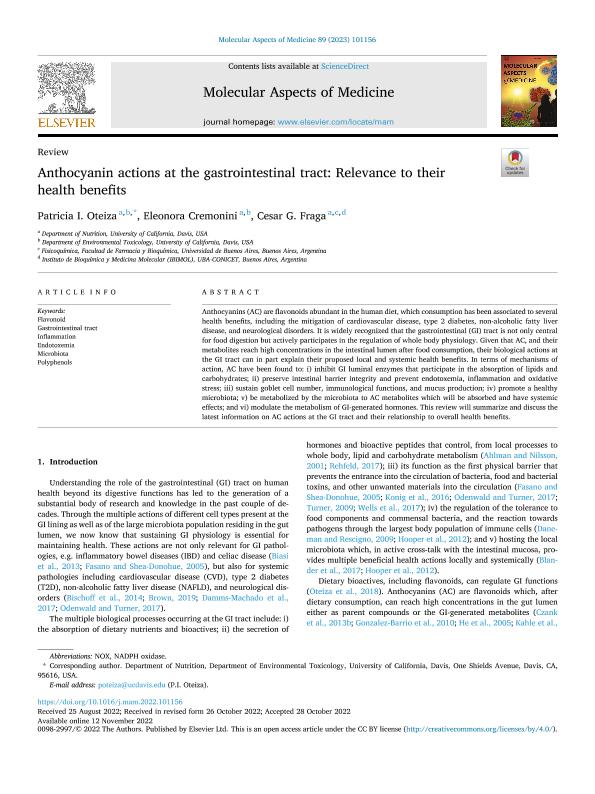Mostrar el registro sencillo del ítem
dc.contributor.author
Oteiza, Patricia I.
dc.contributor.author
Cremonini, Eleonora
dc.contributor.author
Fraga, César Guillermo

dc.date.available
2023-07-14T11:46:10Z
dc.date.issued
2022-11
dc.identifier.citation
Oteiza, Patricia I.; Cremonini, Eleonora; Fraga, César Guillermo; Anthocyanin actions at the gastrointestinal tract: Relevance to their health benefits; Elsevier Science; Molecular Aspects Of Medicine; 89; 11-2022; 1-11
dc.identifier.issn
0098-2997
dc.identifier.uri
http://hdl.handle.net/11336/203927
dc.description.abstract
Anthocyanins (AC) are flavonoids abundant in the human diet, which consumption has been associated to several health benefits, including the mitigation of cardiovascular disease, type 2 diabetes, non-alcoholic fatty liver disease, and neurological disorders. It is widely recognized that the gastrointestinal (GI) tract is not only central for food digestion but actively participates in the regulation of whole body physiology. Given that AC, and their metabolites reach high concentrations in the intestinal lumen after food consumption, their biological actions at the GI tract can in part explain their proposed local and systemic health benefits. In terms of mechanisms of action, AC have been found to: i) inhibit GI luminal enzymes that participate in the absorption of lipids and carbohydrates; ii) preserve intestinal barrier integrity and prevent endotoxemia, inflammation and oxidative stress; iii) sustain goblet cell number, immunological functions, and mucus production; iv) promote a healthy microbiota; v) be metabolized by the microbiota to AC metabolites which will be absorbed and have systemic effects; and vi) modulate the metabolism of GI-generated hormones. This review will summarize and discuss the latest information on AC actions at the GI tract and their relationship to overall health benefits.
dc.format
application/pdf
dc.language.iso
eng
dc.publisher
Elsevier Science

dc.rights
info:eu-repo/semantics/openAccess
dc.rights.uri
https://creativecommons.org/licenses/by/2.5/ar/
dc.subject
ENDOTOXEMIA
dc.subject
FLAVONOID
dc.subject
GASTROINTESTINAL TRACT
dc.subject
INFLAMMATION
dc.subject
MICROBIOTA
dc.subject
POLYPHENOLS
dc.subject.classification
Bioquímica y Biología Molecular

dc.subject.classification
Ciencias Biológicas

dc.subject.classification
CIENCIAS NATURALES Y EXACTAS

dc.title
Anthocyanin actions at the gastrointestinal tract: Relevance to their health benefits
dc.type
info:eu-repo/semantics/article
dc.type
info:ar-repo/semantics/artículo
dc.type
info:eu-repo/semantics/publishedVersion
dc.date.updated
2023-07-05T12:14:59Z
dc.journal.volume
89
dc.journal.pagination
1-11
dc.journal.pais
Países Bajos

dc.journal.ciudad
Amsterdam
dc.description.fil
Fil: Oteiza, Patricia I.. University of California at Davis; Estados Unidos
dc.description.fil
Fil: Cremonini, Eleonora. University of California at Davis; Estados Unidos
dc.description.fil
Fil: Fraga, César Guillermo. Consejo Nacional de Investigaciones Científicas y Técnicas. Oficina de Coordinación Administrativa Houssay. Instituto de Bioquímica y Medicina Molecular. Universidad de Buenos Aires. Facultad Medicina. Instituto de Bioquímica y Medicina Molecular; Argentina
dc.journal.title
Molecular Aspects Of Medicine

dc.relation.alternativeid
info:eu-repo/semantics/altIdentifier/doi/http://dx.doi.org/10.1016/j.mam.2022.101156
Archivos asociados
